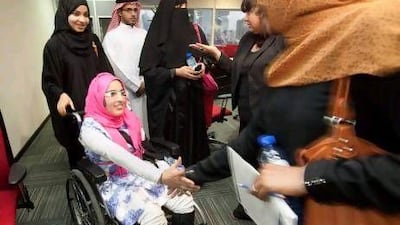DUBAI // Parents of children with disabilities are being caught in a dilemma that is putting access to expensive special-needs education even further out of their reach, experts say.
As the regulations stand, schools that score good marks can apply for a bigger fee increase if they offer special-needs support.
For one Syrian mother, whose seven-year-old boy attends a school with special-needs support, the only way to pay for it is by credit card.
"When he was in the foundation stage I was paying Dh100,000 a year for a shadow teacher," said the mother, who asked to remain anonymous.
"This assistant was contracted to the school and not even trained - she was a nurse."
The school scored high marks for its special-needs programme in the latest round of school inspections carried out by the Dubai Schools Inspection Bureau.
Her son no longer requires a shadow teacher, but he does need speech and occupational therapy, which the school does not provide, four times a week.
"The teacher has modified lessons for him and they pay attention to his specific needs, but he needs more specialist help," the mother said.
"The only way to pay for the fees as well as Dh200 to Dh450 for every special session is through credit cards."
The quality of such education is also under question.
Fatima Belrehif, head of the inspection bureau and author of a paper on improving access to special-needs education in Dubai's private schools, found 76 per cent of special-needs pupils were not making enough progress at school.
Speaking at a forum on special-needs education held by the Knowledge and Human Development Authority at the Dubai School of Government on Tuesday, Ms Belrehif said 60 per cent of the schools do not fully involve parents and design individual learning programmes.
"Before we even start to talk about inclusion at all schools we have to see how it can be done right," said Dr Ruba Tabari, an educational psychologist and consultant who attended the forum.
"Do teachers know what to do, are their strategies practical and applicable, and how flexible can you be with the curricula?"
Dr Tabari agreed the few schools that do get it right have become unaffordable for parents in the process.
"They have to pay for therapy, pay for the shadow teacher and also pay the school fees," she said.
"Those who can are the lucky ones. What about the majority of those who cannot? Where are these children going?"
Nannette Wicker-Essick, executive director of the Kidsfirst Medical Centre that works with 17 schools to provide special-needs programmes, said: "We cannot get to the majority of children because not all parents have that sort of money to pay."
Ms Wicker-Essick said every additional therapy service, even if conducted on school grounds, was billed to the parents.
"These schools have learning support teachers but if parents seek extra therapy for their children, they are charged," she said.
While equal access to education as a concept exists in law, there is no implementation policy for schools to follow, in terms of identifying special needs, budget allocation or teacher training.
Dr Tabari said creating a fund to assist parents in need might be a solution, while Ms Belrehif said schools should factor integration into their financial plans.
"We also encourage them to share practices, be creative with involving the community and entities that can help with those objectives," she said.
"Ultimately, it's down to the basics: inclusion cannot take place without prior training. And every school can afford to have at least that one point of reference to help guide the other teachers in addressing the children's education goals."

